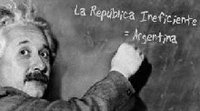The Costs of Orthodoxy
'En este país está todo mal hecho, pero está tan bien hecho que es indestructible.'
(Everything in this country is made badly, but it is so craftily done as to be indestructible.)
--Argentine President Arturo Frondizi (1960)
What a time Argentines had in the nineties, that age of economic marvels. Long-standing corruption and mismanagement seemed to be swept away by a barrage of free-market reforms and a massive influx of foreign capital. Years of hyperinflation and stagnation gave way to a stable peso pegged to the dollar and a solid economy growing at 8 percent annually, apparently untouched by financial crises in Mexico and Asia. Overnight, the perennial underperformer had become the model case of free-market reforms. Everything seemed on track, at last. Ordinary Argentines could trust in and plan for the future. During the last years of President Carlos Saál Menem's second administration, many spoke admiringly of how he had placed economic policy 'on autopilot.'
Argentina was a poster child for neoliberal economics--privatizing everything in sight, restraining wages, limiting social spending, defending the currency, and opening the door wide to foreign capital. So how did everything slide so easily into the four years of deepening recession, rising unemployment, and inexorably increasing debt that have finally led to the largest default in history?"
...
The Costs of Orthodoxy Mark Alan Healey and Ernesto Semón
(Everything in this country is made badly, but it is so craftily done as to be indestructible.)
--Argentine President Arturo Frondizi (1960)
What a time Argentines had in the nineties, that age of economic marvels. Long-standing corruption and mismanagement seemed to be swept away by a barrage of free-market reforms and a massive influx of foreign capital. Years of hyperinflation and stagnation gave way to a stable peso pegged to the dollar and a solid economy growing at 8 percent annually, apparently untouched by financial crises in Mexico and Asia. Overnight, the perennial underperformer had become the model case of free-market reforms. Everything seemed on track, at last. Ordinary Argentines could trust in and plan for the future. During the last years of President Carlos Saál Menem's second administration, many spoke admiringly of how he had placed economic policy 'on autopilot.'
Argentina was a poster child for neoliberal economics--privatizing everything in sight, restraining wages, limiting social spending, defending the currency, and opening the door wide to foreign capital. So how did everything slide so easily into the four years of deepening recession, rising unemployment, and inexorably increasing debt that have finally led to the largest default in history?"
...
The Costs of Orthodoxy Mark Alan Healey and Ernesto Semón













<< Home